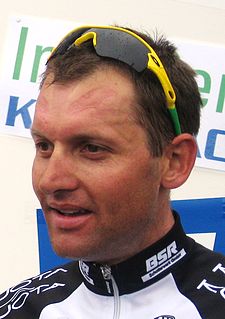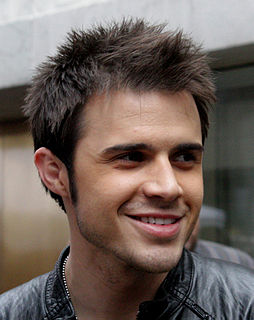A Quote by Luke Roberts
Conflict is good in a negotiation process... it's the clash of two ideas, which then, all being well, produces a third idea.
Related Quotes
I think that to be a good artist, you have to have ideas as well as manual skills. It's a blend of the two, hopefully, and there are a lot of people there that can do things well, but they might not be devoid of good ideas or maybe they're not especially interesting ideas, or maybe there's a good idea that a person is unable to execute in the manner that does justice to the idea.
When I used to perform weddings, the image I always had was the image of a triangle, in which there are two partners and then there is this third force, this third being, that emerges out of the interaction of these two. The third one is the one that is the shared awareness that lies behind the two of them.
Separate out the creative act from the act of editing and execution. Make it a two-step process. First, let ideas flow and encourage EVERY idea to make it to the whiteboard. Don't criticize, judge, edit, budget, or worry. An idea on the wall can't hurt anyone, so let them rip without restriction. After any and all ideas have the opportunity to "come out to play", only then should you apply your analytical and logical side to the effort. Don't mix the creative process with the editing process or you'll kill your ideas before they even get a fighting chance.
When you have a conflict, that means that there are truths that have to be addressed on each side of the conflict. And when you have a conflict, then it's an educational process to try to resolve the conflict. And to resolve that, you have to get people on both sides of the conflict involved so that they can dialogue.
Three elements go to make up an idea. The first is its intrinsic quality as a feeling. The second is the energy with which it affects other ideas, an energy which is infinite in the here-and-nowness of immediate sensation, finite and relative in the recency of the past. The third element is the tendency of an idea to bring along other ideas with it.
I got used to being a writer. To compare it to teaching - I taught for twenty-five years; for the first two or three years it was heady. I was discovering that I could do something and do it well. Be useful to people. It was exhilarating, sort of like the first two weeks of being in love with somebody, and then it becomes like the third bite of pizza. The first bite is wonderful. The second bite is not disappointing. The third? Meh. You get used to it.
I really challenge every actor at the beginning of a process, and I always say, 'I have an idea that I'm going to bring to the table. I hope and expect that you will have an idea and bring it to the table. But the way I really want to work is that together we're going to have a third idea that is better than either of our ideas.'
Big ideas come from the unconscious. This is true in art, in science, and in advertising. But your unconscious has to be well informed, or your idea will be irrelevant. Stuff your conscious mind with information, then unhook your rational thought process. You can help this process by going for a long walk, or taking a hot bath, or drinking half a pint of claret. Suddenly, if the telephone line from your unconscious is open, a big idea wells up within you.
If you hear a good idea, capture it; write it down. Don't trust your memory. Then on a cold wintry evening, go back through your journal, the ideas that changed your life, the ideas that saved your marriage, the ideas that bailed you out of bankruptcy, the ideas that helped you become successful, the ideas that made you millions. What a good review-going back over the collection of ideas that you gathered over the years. So be a collector of good ideas for your business, for your relationships, for your future.




































